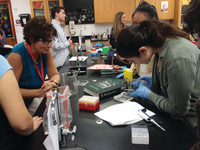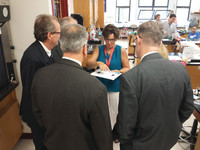The Amgen Biotech Experience (ABE) is expected to reach thousands of students over the next two years, with the students at Cranston High School West among those who will benefit from the …
This item is available in full to subscribers.
We have recently launched a new and improved website. To continue reading, you will need to either log into your subscriber account, or purchase a new subscription.
If you are a current print subscriber, you can set up a free website account by clicking here.
Otherwise, click here to view your options for subscribing.
Please log in to continue |
|


The Amgen Biotech Experience (ABE) is expected to reach thousands of students over the next two years, with the students at Cranston High School West among those who will benefit from the program.
The funding for the program includes $100,000 for the University of Rhode Island to continue empowering Rhode Island teachers to inspire the next generations of scientists by giving their high school students access to the same lab equipment used by research scientists in the field today.
Holly Meyer, science educator at West, was among the first group of teachers to be trained approximately eight years ago, and is now a mentor to the new teachers currently being trained. Once trained, Meyer, a Golden Apple award winner, was able to bring the program to her students at West.
“Twice a year we are allowed to have this equipment, which equals $20,000 of materials, in our classroom for three weeks, free of cost,” Meyer said. “Without this program, I could never offer this type of hands-on biotech learning to my students. It’s just too cost prohibitive.”
A recent visit to Meyer’s classroom by representatives from Amgen, URI, Cranston Public Schools and the office of the Speaker of the House Nicholas Mattiello showed students working in small interactive groups on a forensics lab, dubbed “The Case of the Missing Crown” – an exciting, hands-on DNA lesson involving a mysterious crime with suspects whose names resemble some of those familiar to West students, including D’Arezzo the butler, Mr. Spidell the retired Army officer, Chef Barbieri, Luther-Morris the chauffer, Krous the carpenter, Ms. Borelli the maid, and London the gardener. The lab is one of seven written by David Vito, URI’s coordinator for the program.
During the lesson, the students used Gel Electrophoresis to solve the crime and determine which suspect should take the blame. The evidence included DNA samples of the seven suspects, and the students use industry-standard biotech equipment such as an electrophoresis chamber in their work.
“This lab is great because it gives them an application for their skills,” Meyer said.
Greg Naugle, executive director of process development for Amgen, agreed.
“This process here is very similar to what’s being used out in the industry today, so to see this program here, at this age, at this scale, it’s wonderful. We weren’t doing this in science classes at my age,” he said.
As distinguished guests including Mattiello, former mayor John O’Leary, state Rep. Art Handy, Superintendent Jeannine Nota-Masse, and many West staff members circulated around the room, they spoke to the students about their future endeavors and encouraged them to stay focused on their studies in science, technology, engineering, and math, or STEM.
“I’m really thrilled that you’ve chosen the sciences, it’s a good match for jobs in our state and we want our youth to stay in the state and work in Rhode Island and be gainfully employed,” said Lynne Urbani, director of policy for the speaker.
“If Amgen weren’t here, what a loss this would be,” O’Leary said. “We have a tremendous partnership here.”
Vito noted that the national organization that coordinates to help with funding along with Amgen for this initiative is the Educational Development Corporation (EDC).
“With the sciences, we tell our students that it’s all about collaboration and teamwork,” Meyer said. “Sometimes they are scared off by the idea of hard science or hard math, but here they can all use their strengths to work together, and they can see that there is something for everyone.”
Naugle agreed.
“Math and science can be somewhat abstract, but these types of programs can show the practical implications of the disciplines,” he said. “I didn’t have an appreciation of this in high school, that there’s not just one discipline in this industry.”
West Principal Tom Barbieri was excited about the initiative as he circulated throughout the room.
“This is what education should be about,” he said. “It should be about lighting a spark in students at this level. It should be about connecting with our community and establishing partnerships.”
Comments
No comments on this item Please log in to comment by clicking here